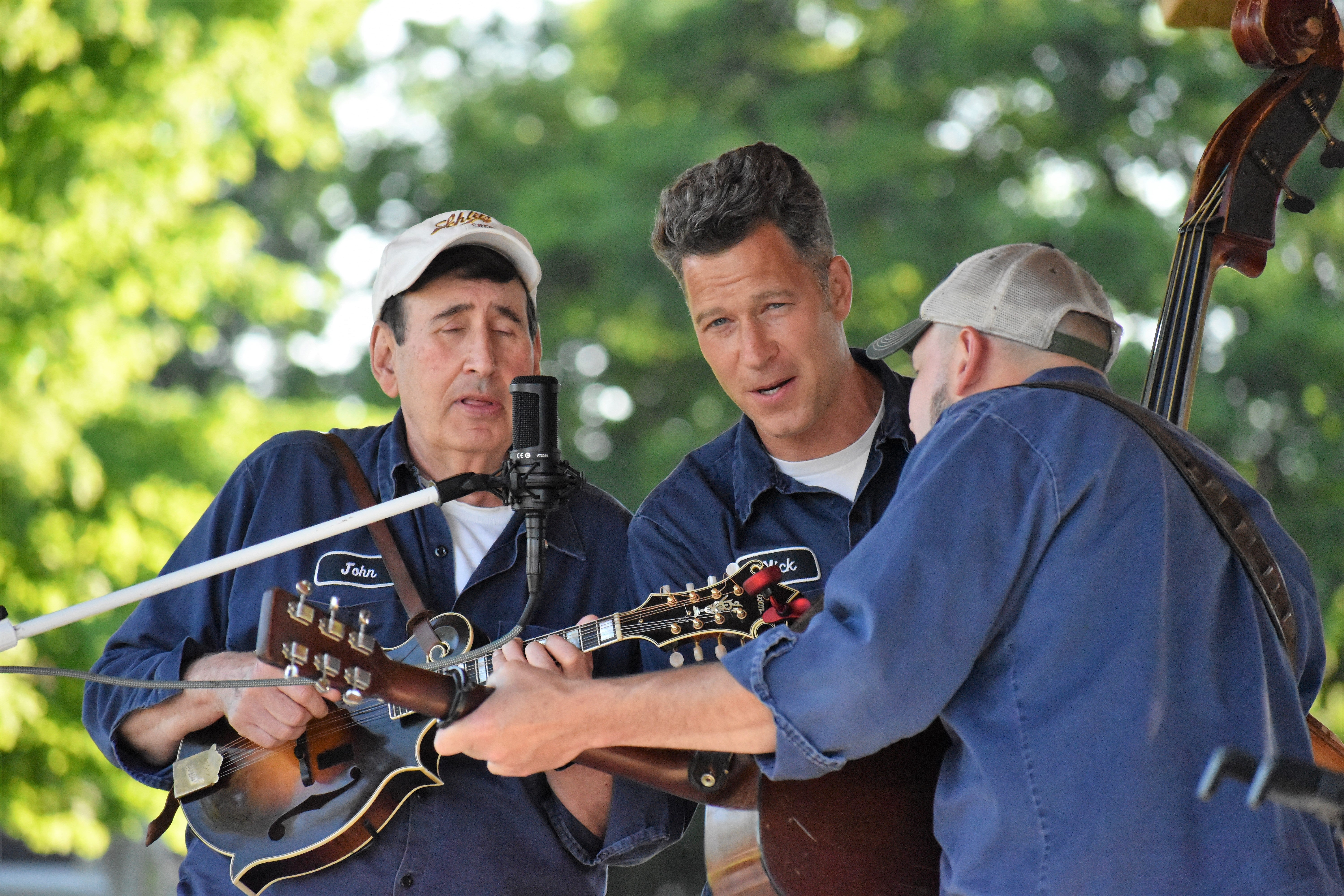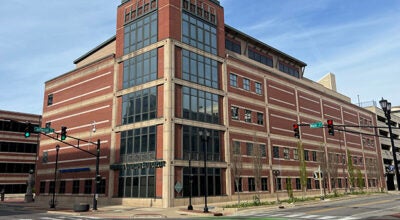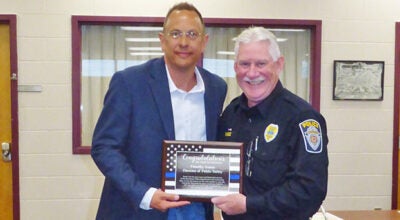Upton listens to full house at City Hall
Published 11:09 pm Wednesday, March 23, 2011

Cass County’s congressman, U.S. Rep. Fred Upton, met with constituents during an 18-stop, three-day “listening tour” which took him to New Buffalo, Niles, Edwardsburg, Dowagiac, Decatur and Stevensville on Wednesday. He began at City Hall with a budget pie chart, then fielded questions from 22 citizens in the capacity crowd in the council chamber.
U.S. Rep. Fred Upton, R-Mich., heard from 22 citizens Wednesday afternoon at Dowagiac City Hall, one of 18 stops over three days on the congressman’s “listening tour.”
Grassroots gripes run the gamut from spending, health care, jobs and foreign aid to right to life and partial birth abortions “because it’s a crime to kill babies,” stigma of mental health services and new mercury light bulbs, but not a third war with Libya starting on the eighth anniversary of the Iraq invasion or nuclear power safety concerns in the wake of Japan’s earthquake and tsunami.
A capacity crowd awaited Upton in the City Council chambers on the upper level of City Hall.
He talked about the budget deficit, took notes about the concerns of the 22 speakers, then addressed some of their concerns for the remaining 22 minutes.
The new chairman of the Energy and Commerce Committee recalled that the Obama administration last fall predicted an Oct. 1, 2012, deficit of $900 billion to start the new fiscal year.
“But when he submitted the budget in February,” Upton said, “things had changed to $1.6 trillion. A big jump, right? The non-partisan Congressional Budget Office, or CBO, scored his budget for 10 years and said the Obama administration underestimated the deficit to the tune of $2.3 trillion. We don’t know who’s right, but it’s a pretty big number we have to deal with.”
Using a pie chart showing 2010-2011 spending of $3.5 trillion, the congressman said “60 percent is pretty hard to touch,” such as Social Security’s $700 billion.
“Actual spending decisions are two-fold, defense ($692 billion) and non-defense ($666 billion).
“We’re going to be asking some tough questions on Libya when Congress gets back into session, I can assure you of that. Last year Congress didn’t pass a budget or any of the single appropriations bills in the House or Senate, so we ended up with continuing resolutions, or CRs,” of which the third expires April 8.
“We’ve cut $2 billion a week,” he said. “We’ve saved $10 billion over five weeks, which isn’t bad. I think we can do better.”
A constituent compared it to “pissing on a forest fire” and said, “Nothing ever gets done with continuing resolutions. Medicaid, people are sucking off society who get better health care than I do working hard and paying my own stuff. Illegals are also sucking off the system. Peter King’s hearings have been compared to McCarthyism, but he was right and I believe King’s right, too. It’s a serious threat and everybody’s afraid to be politically incorrect, and that’s how we’re going to get taken over.”
“We used to be the greatest nation on earth,” a Dowagiac man said.
“And yet, we’re borrowing money from China and Japan. That’s horrendous. The budget needs to be dealt with. We have a lot of natural gas and, with gas prices going up drastically by the end of the year, I don’t know why we haven’t pushed to use natural gas for the last 30 years.”
“How much longer are we going to support China with people in our country out of work?” a woman asked. “I bought a coffee pot at Pamida that I couldn’t even tell was made in China until I opened the box. The United States cannot even make a coffee pot?”
Cassopolis Village Manager Meg Cluckey commented, “I’m tasked with finding efficiencies and living within our means, and yet I don’t see the federal government doing that. We can balance our books and still perform the services we’re charged with, and yet, at the national level I don’t see that. That falls on the backs of our communities and our local communities, to fix your problems.”
A man from north of Eau Claire said the IRS notified him he would not receive tax forms because he should e-file. “Have you ever tried to e-file on dile-up?” Another man suggested a full audit of the Federal Reserve Bank. A third man suggested Ben Bernanke be brought up on charges for lying to Congress.
A Berrien County fruit grower urged Upton to rein in the Environmental Protection Agency (EPA). “I thought Mother Nature was the biggest challenge, but it’s the acronyms — EPA, USDA, ICE. The EPA is the biggest because their choices don’t seem based on science. It’s crippling our industry in this area. Organic is not a cut-and-dried choice yet because of the humidity. We have a lot of work we need done, but we can’t hire people because every year energy and labor costs eat up any gains we make.”
Karen Judd, involved with Borgess-Lee Memorial Hospital for more than 30 years, said, “Yesterday we got the first indications of what Obamacare is going to do to our health care plans, and it’s overwhelming. I find it quite negative. I don’t know how we can survive it as a hospital. I just looked at 10 pages and the red tape, it’s just one thing after another. It’s going to take more staff to take care of all of the things and the government in Washington is just going to grow and grow. I have real concerns.”
Another woman offered “almost an opposite opinion. It takes an educated public to run a democracy and a strong middle class is essential. We need jobs and people to be employed. The troubling thing is how much money you have to get out of such a small portion of the pie. That seems nearly impossible unless you review some of the things on the left side to equalize spending reductions. My husband needed a colonoscopy which would have been denied except under this health care.”
A substitute teacher said teachers are “blamed for too much. There are a good number who need support and encouragement — not criticism.”
Upton was asked if he is a RINO (Republican in Name Only). “I’ve been called a lot of things,” he said.
Upton, whose staff was praised as “second to none” by Scott Davis of the Tea Party, explained that his offices in St. Joseph and Kalamazoo “help everyone who might have a federal need getting through red tape. You have to reach out to us and we’ll reach back to you and get you to fill out a privacy form and see what we can do. We can’t wave a magic wand and change the law in terms of who’s eligible and who’s not, but we’re able to help an awful lot of people on a whole variety of issues. I voted for mental health parity in health care. I believe in that very strongly. I would rather have you work, participate, pay taxes and feel part of American society. I met with a number of disabled blind folks and look at what they do in Kalamazoo to help. The Earned Income Tax Credit S chip was set up by former Speaker Newt Gingrich. Families on welfare lost their benefits if they worked, which was a disincentive.”
Upton, who promised an internship to DePauw freshman Drew Cripe between his junior and senior years “if I’m there,” said “most state employees are required to participate in Social Security. It’s still rumored that members of Congress and their staffs aren’t in Social Security, but they are, as they should be, for almost 30 years now.
“As we look at entitlement reform, there are going to be a lot of things on the table, including lifting the cap and raising the age. I’m going to be 58 next month. Social Security is considered part of the budget. As we baby boomers get closer to 67, I think you’ll look at a number of different issues that they can continue to make sure the money coming in is equal or greater than the money going out.
“A lot of discussion here on cutting spending,” Upton said. “When the foreign aid bill comes up, unlike last year when it was packaged with all the other different spending bills, it will be by itself. Speaker Boehner said all of these bills will be open to amendment, whether it’s Ireland or China. I do believe in a balanced budget and we may see that issue of a constitutional amendment come up again this spring. I co-sponsored Ron Paul’s bill to audit the Fed.”
“A year ago today,” Upton said, “Congress passed and the president signed the health care bill, which is often called Obamacare. If you remember the president saying, ‘If you like your health care, you can keep it,’ for lots of folks that’s simply not going to be true. Almost 50 percent of Michigan seniors who had Medicare Advantage no longer are able to participate, so they lost the health care they wanted. The Michigan Hospital Association was neutral on the legislation, many acknowledged that because of the reimbursement cuts to hospitals, perhaps as many as 15 percent of our hospitals would close. I sat down with the administrators of Borgess, Bronson and Lakeland in the last year. For them, they’re looking at reductions in the neighborhood of $100 million. I know the Dowagiac hospital is going to be seeing that as well. The $105 billion in the bill that no one knew about? Remember Speaker Pelosi’s comment, ‘You’ve got to pass it before you know what’s in it.’ It’s a 2,700-page bill with no amendments in the House. The Senate passed it on Christmas Eve morning at 7:30. Democrats said there were a lot of problems that they’d fix with amendments later on in the House. It never came back to the House. To me, that’s not how you deal with health reform.
“I’m convinced there were a number of Republican and Democratic ideas that would have worked on health reform, like allowing folks to purchase health insurance across state lines. The more providers you have, the more competition, which should maybe drive costs down. Yes, we should end the practice of discrimination of those with pre-existing illnesses in denying insurance. Having children up to age 26 (on their parents’ coverage) is in effect now and will not be repealed, but I did vote to repeal it and so did the House. The Senate did not. Now we’re in a stalemate, but we have the judicial branch. Two federal judges have ruled it unconstitutional. My view is we ought to expedite review by the U.S. Supreme Court. Let’s hear arguments this summer and see a verdict this fall. Otherwise, every state is going to be required to spend tens of millions of dollars to write regulations for these state exchanges. Our state certainly doesn’t have that money.”
Upton remains an Amtrak supporter in favor of trains stopping in Dowagiac, but “I don’t know what the state budget’s doing to it,” urging depot host Ron Leatz to “weigh in with” Reps. Sharon Tyler, Matt Lori and Al Pscholka and Sen. John Proos.
He told a Cassopolis woman that the state Legislature is taking up legislation to regulate huffing bathsalts.
Leatz had said, “The only high-speed rail in the United States is from Porter, Ind., to Kalamazoo. Right now, 95, 110 by the end of the summer. We have no way to get out of this community — no bus lines, no taxi cabs. To go anyplace, you’re going to take the train. We get people from all over — St. Joe, Elkhart, Ind., Three Rivers, Buchanan — because this train goes toward Detroit and Port Huron. If they decide to cut Amtrak, two of our trains are supported by MDOT. Our new governor wants to cut everything. When he cuts the subsidy, I think we’re going to end up with one train in Michigan.”
On energy, Upton commented, “We have a real problem in that we don’t have a policy in this country. We consume 20 million barrels a day as a nation and produce 7 million. Back in the ’70s, we imported 30 percent of our oil; today, 70 percent. In the Gulf, where a third of our oil comes from, since the BP spill we’ve said no to new drilling permits, no to production. Production has declined. I’m going to be talking to the Secretary of Energy later this afternoon. When (Ken Salazar) testified before our committee last week, his numbers showed between 2009 and 2012 in the Gulf, we’re going to get about 450,000 barrels a day less. In Alaska, production is going down about 10 percent a year for that pipeline down to Prudhoe Bay. We had testimony a couple of weeks ago from the former president of Shell. They had spent $3.5 billion trying to develop two test wells off the coast of Alaska where they thought there was as much as 25 billion barrels underneath. They’ve been at it five or six years, got the required 35 permits and the clean air permit was pulled at the last minute, so they’re now done for the year. We’re turning our back on domestic sources. USA Today last week in an editorial supported the Keystone Pipeline, which would connect Alberta, Canada, with the Lower 48. Alberta’s producing 4 million barrels a day from oil sands. We’d like to refine it here and use it here and, frankly, I’d rather pay the Canadians than somebody over in the Middle East.” Applause.
“If we don’t use it here,” Upton added, “it will go to China. They’ll build a pipeline instead to Vancouver and put it on a boat. That’s a larger carbon footprint than putting it in a pipeline that would be one of the largest construction projects ever done in the United States. Jobs, which we need to work on. We’ve lost one in five manufacturing jobs across the country. A lot in the auto sector. Michigan is more damaged than any other state because almost half of those jobs came from our state.”
As co-chair of the Auto Caucus, “I worked hard to bring the Lake Orion GM plant to Michigan,” he said, over Tennessee or Wisconsin. “We got it here and they’re actually adding production there this summer. There are a lot of auto suppliers here in Cass, St. Joseph, Berrien and Van Buren counties.”
“Your Republican plan would cost 700,000 to 1 million jobs, according to independent analysis,” interjected Union High School teacher Dan Vanden Heede.






